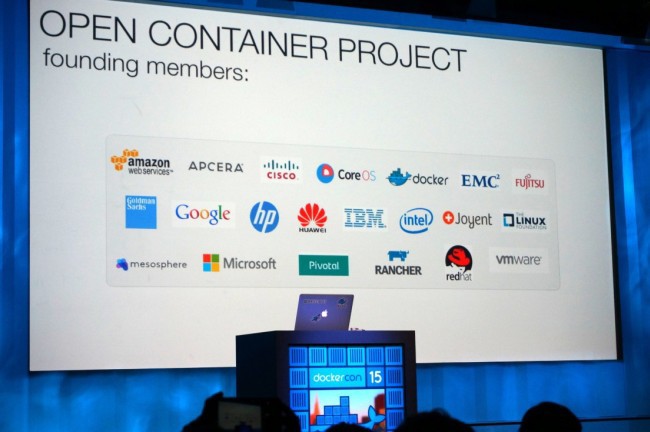Docker, CoreOS, Google, Microsoft and Amazon create a shared container format.

Docker monopoly is canceled.
Docker, CoreOS, Google, Microsoft and Amazon have announced a joint development under the supervision of the Linux Foundation open standard for software containers.
')
In addition to the listed companies, Apcera, Cisco, EMC, Fujitsu Limited, Goldman Sachs, HP, Huawei, IBM, Intel, Joyent, Mesosphere, Pivotal, Rancher Labs, Red Hat and VMware participate in the Open Container project. That is, almost everyone who actually does virtualization.
Currently, Docker is considered almost synonymous with the word “container”, but this is just one of the formats. Not everyone agrees that it should become the standard. Last December, CoreOS announced the launch of containers in its own runtime environment Rocket (rkt) and in its format (appc). This project received the support of some big players like Google, Red Hat and VMware.
Everything looked as if we could expect the beginning of a “container format war” between Docker and CoreOS, which obviously would be to the detriment of the entire ecosystem. Thank God that reason triumphed and this will not happen.

The two companies will collaborate, along with other members of the Open Container Project. The project is registered as a non-profit organization that “aims to set open standards for software containers.”
The format and runtime environment of Docker will form the basis for the new standard, and this startup has undertaken to provide a draft standard and source code for the format of its images and the runtime engine. With this, everything will start.
If you adopt a single standard, the container can be easily transferred from one hosting to another and it will work in any environment, be it Docker, CoreOS, Kurma or Jetpack.
This is good news for all those who use cloud services and virtual machines: “With the announcement of the Open Container Project, Docker has proven that it is ready to talk,” said CoreOS founder and CEO, Alex Polvi. “Today, Docker is the de facto format for container images, and therefore it is the right platform to start creating a standard. We still think that there are a lot of technical issues with their format, but together we can solve these problems for the benefit of the entire industry. ”
Docker understands that it is losing complete control over its own infrastructure, but does so for the benefit of the entire containerization market. In the end, she herself will benefit from the discovery of the source code and the adoption of a single standard. Fragmentation of the market will not benefit anyone.
Google Cloud Platform Product Manager Craig McLuckie agrees that adopting a single format will make the ecosystem stronger and allow Docker to use many good ideas from outside.
It is worth noting that the business model is not tied to its own format. The company earns the tools to manage the installation of containers. That is, in the case of market expansion with the adoption of a single standard, it can even expand its business.
via TechCrunch
Source: https://habr.com/ru/post/357778/
All Articles